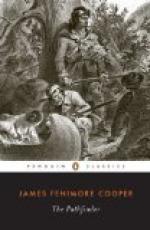“Arrowhead can tell his own from that of another. This canoe is mine; I found it on the shore near the fort.”
“That sounds reasonable, too, for the canoe does belong to the man, and an Indian would make few words about taking it. Still, it is extraordinary that we saw nothing of the fellow and his wife, for the canoe must have left the river before we did ourselves.”
This idea, which passed rapidly through the mind of the guide, was now put to the Indian in the shape of a question.
“Pathfinder knows that a warrior can have shame. The father would have asked me for his daughter, and I could not give her to him. I sent the Dew-of-June for the canoe, and no one spoke to the woman. A Tuscarora woman would not be free in speaking to strange men.”
All this, too, was plausible, and in conformity with Indian character and customs. As was usual, Arrowhead had received one half of his compensation previously to quitting the Mohawk; and his refraining to demand the residue was a proof of that conscientious consideration of mutual rights that quite as often distinguishes the morality of a savage as that of a Christian. To one as upright as Pathfinder, Arrowhead had conducted himself with delicacy and propriety, though it would have been more in accordance with his own frank nature to have met the father, and abided by the simple truth. Still, accustomed to the ways of Indians, he saw nothing out of the ordinary track of things in the course the other had taken.
“This runs like water flowing down hill, Arrowhead,” he answered, after a little reflection, “and truth obliges me to own it. It was the gift of a red-skin to act in this way, though I do not think it was the gift of a pale-face. You would not look upon the grief of the girl’s father?”
Arrowhead made a quiet inclination of the body as if to assent.
“One thing more my brother will tell me,” continued Pathfinder, “and there will be no cloud between his wigwam and the strong-house of the Yengeese. If he can blow away this bit of fog with his breath, his friends will look at him as he sits by his own fire, and he can look at them as they lay aside their arms, and forget that they are warriors. Why was the head of Arrowhead’s canoe looking towards the St. Lawrence, where there are none but enemies to be found?”
“Why were the Pathfinder and his friends looking the same way?” asked the Tuscarora calmly. “A Tuscarora may look in the same direction as a Yengeese.”
“Why, to own the truth, Arrowhead, we are out scouting like; that is, sailing — in other words, we are on the king’s business, and we have a right to be here, though we may not have a right to say why we are here.”
“Arrowhead saw the big canoe, and he loves to look on the face of Eau-douce. He was going towards the sun at evening in order to seek his wigwam; but, finding that the young sailor was going the other way, he turned that he might look in the same direction. Eau-douce and Arrowhead were together on the last trail.”




